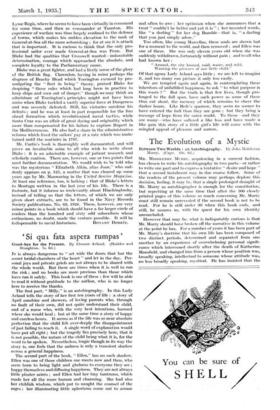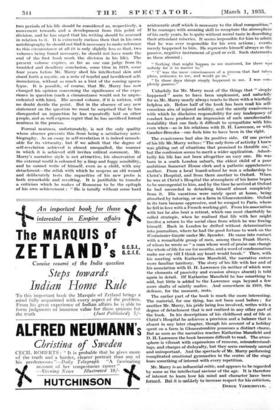The Evolution of a Mystic
MR. MIDDLETON MuaRr, acquiescing in a current fashion, has chosen to write his autobiography in two parts—or rather to write one part and to express a tentative " desire and hope '.' that a second instalment may in due course follow. Some of the readers of the present volume may perhaps deplore this decision, feeling, it may be, that a single prolonged draught of Mr. Murry as autobiographer is enough for the constitution, but regretting at the same time that after the 500 closely printed pages of this volume so much concerning Mr. Murry must still remain unrevealed if the second book is not to be read. For he is still under 30 when this book ends, and still, he assures us, with the quest for his own identity
unconcluded. •
However that may be, what is indisputably curious is that Mr. Murry should have broken off the narrative in this volume at the point he has. For a number of years it has been part of Mr. Murry's doctrine that his own life has been composed of two distinct periods, determined and separated from one another by an experience of overwhelming personal signifi- cance which intervened shortly after the death of Katherine Mansfield, and changed him from a person whose position was, broadly speaking, intellectual to someone whose attitude was, no less broadly speaking, mystical. He hag insisted that the
two periods of his life should be considered as, respectively, a movement towards and a development from this point of division, and he has urged that his writing should be assessed in relation to it. It is extremely curious then that in his own autobiography he should not find it necessary to make reference to this circumstance at all (it is only slightly less so that, two volumes being found necessary, he should not have made the end of the first book mark the division in his life). The present volume expires, as far as one can judge from its troubled and desultory conclusion, some time in 1919, some four years before Mr. Murry shed his intellectual skin and stood forth a mystic, on a note of tearful and bewildered self- immolation, without so much as a hint of the coming apoca- lypse. It is possible, of course, that Mr. Murry has now changed his opinion concerning the significance of the expo- " rience in question (such a circumstance would not he unpre- cedented with him). His second volume, if it is written, will no doubt decide the point. But in the absence of any new statement on the question we must be surprised that he has disregarded an injunction he has repeatedly laid on other people, and as well express regret that he has sacrificed formal neatness in the process.
Formal neatness, unfortunately, is not the only quality whose absence prevents this from being- a satisfactory auto- biography. As an essay in self-revelation it is indeed remark- able for its virtuosity, but if we admit that the degree of self-revelation achieved is almost unequalled, the manner in which it is achieved still invites critical comment. Mr. Murry's narrative style is not attractive, his observation of the external world is coloured by a limp and foggy sensibility, and he cannot write of himself, even as a child, with any detachment—the relish with which he reopens an old wound and deliberately tests the capacities of his new probe is both remarkable and revolting. It is justifiable to transfer a criticism which he makes of Rousseau to be the epitaph of his own achievement : " He is totally without some hard aristocratic stuff which is necessary to the ideal composition." If he manages with amazing skill to recapture the atmosphere
of his early years, he is quite without moral taste in describing their attendant miseries. It seems impossible foi him to adnlit that he was ever responsible for his own actions ; events merely happened to him. He represents himself always as the passive, negative instrument of good or evil. Such statements as these abound : " Nothing that. might happen- to me mattered, for there wits nobody for it to matter to."
" 'I' was the mere consciousness of a process that had taken place, unknown to me, and would go on."
" In those days things simply happened to me. I was com- pletely passive."
Unluckily for Mr. Murry most of the things that " simply happened " seem to have been unpleasant, and unluckily for us Mr. Murry nearly always reacts to them with a tearfully helpless air. Before half of the book has been read his self- conscious airs of injured nobility, and the saintly evasiveness with which he disclaims responsibility for any inadequacy of conduct have produced an impression of such unredeemable
instability that one finds it difficult to sympathize with him even when—as in his relations with D. H. Lawrence, or with Gaudier-Brzeska—one feels him to have been in the right.
The evasiveness had also its positive side. Of one period of his life Mr. Murry writes : "The only form of activity I knew was gliding out of situations that promised to throttle me," but the confession seems to merit a wider application. Admit-
tedly his life has not been altogether an easy one. He was born in a south London suburb, the eldest child of a poor ambitious Somerset House clerk and a pathetic apprehensive mother. From a local board-school he won a scholarship to Christ's Hospital, and from there another to Oxford. When he was at Christ's Hospital the atmosphere of his home began to be uncongenial to him, and by the time he-arrived at Oxfozd he had succeeded in detaching himself almost completely from it. His vacations were rarely spent at home, being absorbed by tutoring, or on a farm in Gloucestershire. Oxford in its turn became oppressive, and he escaped to Paris, where he fell in love with a French working girl. From his association with her he also beat a retreat, which can most charitably be called strategic, when he realized that life with her might involve a return to the social class from which he was freeing himself. Back in London he drifted without determination into journalism, where he had the good fortune to work on the Westminster Gazette under Mr. Spender. He came into contact with a remarkable group of men, among them Frank Harris, of whom he wrote as " a man whose word of praise can change the whole of life for me for months, and a word of condemnation make me cry till I think my heart would break." Then, with his meeting with Katherine Mansfield, the narrative enters more familiar territory. The story of his life with her and of his association with D. H. Lawrence (in neither of which were the elements of passivity and evasion always absent) is told again in detail. Of Katherine Mansfield he has something to -add, but little is added to the Lawrence saga beyond a few more shafts of saintly malice. And somewhere in 1919, the defence, for the moment,- rests.
The earlier part of the book is much the more interesting. The material, for one thing, has not been used before ; for another Mr. Murry, his pride being less involved, writes with a degree of detachment that is not realized in any other part of the book. In his descriptions of his childhood and of life at Christ's Hospital he achieves a precision and a balance that is absent in any later chapter, though his account of a holiday spent on a farm in Gloucestershire possesses a distinct charm. But as soon as the narrative reaches Katherine Mansfield and D. H. Lawrence the book becomes difficult to read. The atmo- sphere is vibrant with expressions of remorse, misunderstand- ings, and charges of disloyalty, but they seem curiously unreal and unimportant. And the spectacle of Mr. Murry performing complicated emotional gymnastics in the centre of the stage loses something of interest with every repetition.
Mr. Murry is an influential critic, and appears to be regarded by some as the intellectual saviour of the age. It is therefore of interest to learn how his mind and character have been formed. Bui it is unlikely to increase respect for his criticism.
DEREK VAREICHOYLE.



























































 Previous page
Previous page